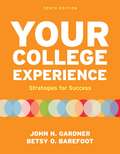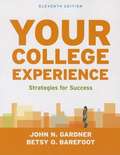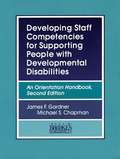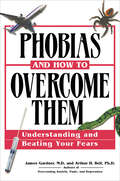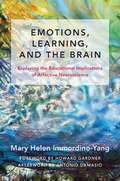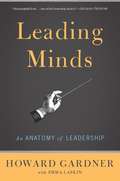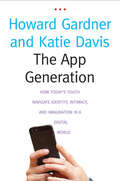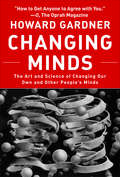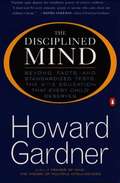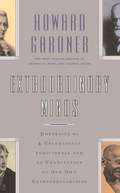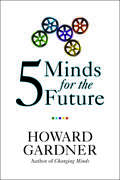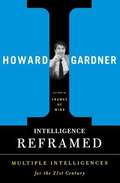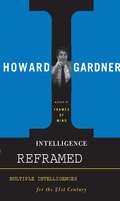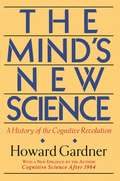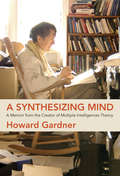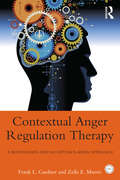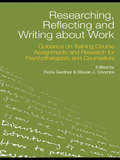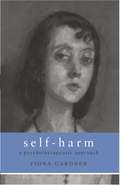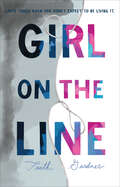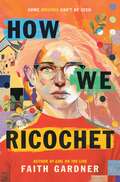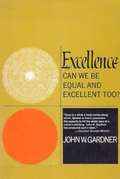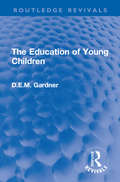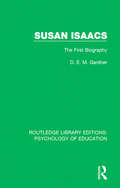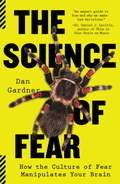- Table View
- List View
Your College Experience: Strategies for Success (Tenth Edition)
by John N. Gardner A. Jerome Jewler Betsy O. BarefootWritten by the leading authorities on the first-year seminar and grounded in research, Your College Experience by John Gardner and Betsy Barefoot offers today's diverse students the practical help they need to make the transition to college and get the most out of their time there. Goal setting has always been central to this text, and the Tenth Edition has been revised with added coverage and activities to strengthen this material throughout. In addition, a new focus on self-assessment of strengths will help students see where they are already succeeding so that they get off to a great start and stay in college. A full package of instructional support materials -- including an Instructor's Annotated Edition, Instructor's Manual, PowerPoint slides, videos, and a Test Bank -- provides new and experienced instructors all the tools they will need to engage students in this course and increase student retention.
Your College Experience: Strategies for Success 11th edition
by John N. Gardner Betsy O. BarefootWhile maintaining its hallmark theme of goal setting, the Eleventh Edition reflects a focus on practical strategies across all topics of the book to help students be successful from the start. Chapters on Time Management, Communication and Information Literacy, and Careers and Majors have all been thoroughly updated to fully incorporate the tools and strategies students use on campus right now.
Developing Staff Competencies For Supporting People With Developmental Disabilities: An Orientation Handbook
by James F. Gardner Michael S. ChapmanFormerly titled "Staff Development in Mental Retardation Services: A Practical Handbook, " this second edition, in an easier-to-use format, gives service providers helpful strategies for increasing effectiveness and maintaining well-being while working in the rewarding yet challenging field of human services. Filled with answers to pertinent questions about service development, delivery, and assessment, this intuitive guide also offers guidelines for working with families, coping with stress and burnout, and enhancing service management and quality.
Phobias and How to Overcome Them: Understanding and Beating Your Fears
by James Gardner Arthur H. BellFear of flying, fear of spiders, fear of crowds, fear of needles. There seems an endless list of phobias that between them afflict up to half the population. This book describes the most common hang-ups and how to come to terms with them.
Emotions, Learning, and the Brain: Exploring the Educational Implications of Affective Neuroscience (The Norton Series on the Social Neuroscience of Education)
by Howard Gardner Mary Helen Immordino-Yang Antonio DamasioAn orientation to affective neuroscience as it relates to educators. In this ground-breaking collection, Mary Helen Immordino-Yang--an affective neuroscientist, human development psychologist, and former public school teacher--presents a decade of work with the potential to revolutionize educational theory and practice by deeply enriching our understanding of the complex connection between emotion and learning. With her signature talent for explaining and interpreting neuroscientific findings in practical, teacher-relevant terms, Immordino-Yang offers two simple but profound ideas: first, that emotions are such powerful motivators of learning because they activate brain mechanisms that originally evolved to manage our basic survival; and second, that meaningful thinking and learning are inherently emotional, because we only think deeply about things we care about. Together, these insights suggest that in order to motivate students for academic learning, produce deep understanding, and ensure the transfer of educational experiences into real-world skills and careers, educators must find ways to leverage the emotional aspects of learning. Immordino-Yang has both the gift for captivating readers with her research and the ability to connect this research to everyday learning and teaching. She examines true stories of learning success with relentless curiosity and an illuminating mixture of the scientific and the human. What are feelings, and how does the brain support them? What role do feelings play in the brain's learning process? This book unpacks these crucial questions and many more, including the neurobiological, developmental, and evolutionary origins of creativity, facts and myths about mirror neurons, and how the perspective of social and affective neuroscience can inform the design of learning technologies.
Leading Minds: An Anatomy Of Leadership
by Howard Gardner Emma LaskinPsychologist Howard Gardner, creator of the multiple intelligences framework and author of many books on the mind, explores the major facets of leadership from the perspective of psychology. In this work for general readers (first published in 1995), he presents a framework for understanding leadership and illustrates the framework with profiles of famous leaders such as anthropologist Margaret Mead, civil rights leader Martin Luther King, Jr. , Pope John XXIII, and Mahatma Gandhi. The book is illustrated with b&w historical photos of leaders. This edition contains a new preface by Gardner reviewing his reasons for writing the book, offering reflections on the past 15 years in leadership studies, and commenting on how leadership has changed in the era of "truthiness, twaddle, and Twitter. " Annotation ©2012 Book News, Inc. , Portland, OR (booknews. com)
The App Generation
by Howard Gardner Katie DavisNo one has failed to notice that the current generation of youth is deeply--some would say totally--involved with digital media. Professors Howard Gardner and Katie Davis name today's young people The App Generation, and in this spellbinding book they explore what it means to be "app-dependent" versus "app-enabled" and how life for this generation differs from life before the digital era. Gardner and Davis are concerned with three vital areas of adolescent life: identity, intimacy, and imagination. Through innovative research, including interviews of young people, focus groups of those who work with them, and a unique comparison of youthful artistic productions before and after the digital revolution, the authors uncover the drawbacks of apps: they may foreclose a sense of identity, encourage superficial relations with others, and stunt creative imagination. On the other hand, the benefits of apps are equally striking: they can promote a strong sense of identity, allow deep relationships, and stimulate creativity. The challenge is to venture beyond the ways that apps are designed to be used, Gardner and Davis conclude, and they suggest how the power of apps can be a springboard to greater creativity and higher aspirations.
Changing Minds: The Art and Science of Changing Our Own and Other People's Minds
by Howard GardnerThink about the last time you tried to change someone's mind about something important: a voter's political beliefs; a customer's favorite brand; a spouse's decorating taste. Chances are you weren't successful in shifting that person's beliefs in any way. In his book, Changing Minds, Harvard psychologist Howard Gardner explains what happens during the course of changing a mind - and offers ways to influence that process. Remember that we don't change our minds overnight, it happens in gradual stages that can be powerfully influenced along the way. This book provides insights that can broaden our horizons and shape our lives.
The Disciplined Mind: Beyond Facts Standardized Tests K 12 Educ That Every Child Deserves
by Howard Gardner<P>Howard Gardner's concept of multiple intelligences has been hailed as perhaps the most profound insight into education since the work of Jerome Bruner, Jean Piaget, and, even earlier, John Dewey.<P> Now in The Disciplined Mind, Gardner pulls together the threads of his previous works in a major new synthesis aimed at parents, educators, and the general public alike.<P> The Disciplined Mind looks beyond such parochial issues as charters, vouchers, unions, and affirmative action in order to explore the larger questions of what an educated person should be and how such an education can be achieved for all students.<P> Gardner eloquently argues that the purpose of K-12 education should be to enhance students' deep understanding of truth (and falsity), beauty (and ugliness), and goodness (and evil) as defined by their various cultures. With this stance, Gardner transforms the tired debate between "traditionalists" and "progressives.".
Extraordinary Minds: Portraits of Exceptional Individuals and an Examination of Our Extraordinariness
by Howard GardnerFifteen years ago, psychologist and educator Howard Gardner introduced the idea of multiple intelligences, challenging the presumption that intelligence consists of verbal or analytic abilities only-those intelligences that schools tend to measure. He argued for a broader understanding of the intelligent mind, one that embraces creation in the arts and music, spatial reasoning, and the ability to understand ourselves and others. Today, Gardner’s ideas have become widely accepted-indeed, they have changed how we think about intelligence, genius, creativity, and even leadership, and he is widely regarded as one of the most important voices writing on these subjects. Now, in Extraordinary Minds, a book as riveting as it is new, Gardner poses an important question: Is there a set of traits shared by all truly great achievers-those we deem extraordinary-no matter their field or the time period within which they did their important work?In an attempt to answer this question, Gardner first examines how most of us mature into more or less competent adults. He then examines closely four persons who lived unquestionably extraordinary lives-Mozart, Freud, Woolf, and Gandhi-using each as an exemplar of a different kind of extraordinariness: Mozart as the master of a discipline, Freud as the innovative founder of a new discipline, Woolf as the great introspector, and Gandhi as the influencer. What can we learn about ourselves from the experiences of the extraordinary? Interestingly, Gardner finds that an excess of raw power is not the most impressive characteristic shared by superachievers; rather, these extraordinary individuals all have had a special talent for identifying their own strengths and weaknesses, for accurately analyzing the events of their own lives, and for converting into future successes those inevitable setbacks that mark every life. Gardner provides answers to a number of provocative questions, among them: How do we explain extraordinary times-Athens in the fifth century B. C. , the T’ang Dynasty in the eighth century, Islamic Society in the late Middle Ages, and New York at the middle of the century? What is the relation among genius, creativity, fame, success, and moral extraordinariness? Does extraordinariness make for a happier, more fulfilling life, or does it simply create a special onus?
Five Minds for the Future
by Howard GardnerWe live in a time of relentless change. The only thing that?s certain is that new challenges and opportunities will emerge that are virtually unimaginable today. How can we know which skills will be required to succeed?In Five Minds for the Future, bestselling author Howard Gardner shows how we will each need to master "five minds" that the fast-paced future will demand:· The disciplined mind, to learn at least one profession, as well as the major thinking (science, math, history, etc.) behind it· The synthesizing mind, to organize the massive amounts of information and communicate effectively to others· The creating mind, to revel in unasked questions - and uncover new phenomena and insightful apt answers· The respectful mind, to appreciate the differences between human beings - and understand and work with all persons· The ethical mind, to fulfill one's responsibilities as both a worker and a citizenWithout these "minds," we risk being overwhelmed by information, unable to succeed in the workplace, and incapable of the judgment needed to thrive both personally and professionally.Complete with a substantial new introduction, Five Minds for the Future provides valuable tools for those looking ahead to the next generation of leaders - and for all of us striving to excel in a complex world.Howard Gardner-cited by Foreign Policy magazine as one of the one hundred most influential public intellectuals in the world, and a MacArthur Fellowship recipient-is the Hobbs Professor of Cognition and Education at the Harvard Graduate School of Education.
Intelligence Reframed: Multiple Intelligences for the 21st Century
by Howard GardnerGardner (cognition and education, Harvard U.) broadens his theory of multiple intelligences first posited in 1983 to include intelligences of the existential and naturalist types and multiple forms of creativity. The McArthur genius award recipient advises on applications of his theory, responds to critics, and provides global contacts on MI theory.
Intelligence Reframed: Multiple Intelligences for the 21st Century
by Howard GardnerHarvard psychologist Howard Gardner has been acclaimed as the most influential educational theorist since John Dewey. His ideas about intelligence and creativity - explicated in such bestselling books as Frames of Mind and Multiple Intelligences (over 200,000 copies in print combined) - have revolutionized our thinking. In his groundbreaking 1983 book Frames of Mind, Howard Gardner first introduced the theory of multiple intelligences, which posits that intelligence is more than a single property of the human mind. That theory has become widely accepted as one of the seminal ideas of the twentieth century and continues to attract attention all over the world. Now in Intelligence Reframed, Gardner provides a much-needed report on the theory, its evolution and revisions. He offers practical guidance on the educational uses of the theory and responds to the critiques leveled against him. He also introduces two new intelligences (existential intelligence and naturalist intelligence) and argues that the concept of intelligence should be broadened, but not so absurdly that it includes every human virtue and value. Ultimately, argues Gardner, possessing a basic set of seven or eight intelligences is not only a unique trademark of the human species, but also perhaps even a working definition of the species. Gardner also offers provocative ideas about creativity, leadership, and moral excellence, and speculates about the relationship between multiple intelligences and the world of work in the future.
The Mind's New Science: A History of the Cognitive Revolution
by Howard GardnerThe first full-scale history of cognitive science, this work addresses a central issue: What is the nature of knowledge?
A Synthesizing Mind: A Memoir from the Creator of Multiple Intelligences Theory
by Howard GardnerThe influential author and eminent authority on the human mind reflects on his groundbreaking work and the many forms of intelligence--including his own.Howard Gardner's Frames of Mind was that rare publishing phenomenon--a mind-changer. Widely read by the general public as well as by educators, this influential book laid out Gardner's theory of multiple intelligences. It debunked the primacy of the IQ test and inspired new approaches to education; entire curricula, schools, museums, and parents' guides were dedicated to the nurturing of the several intelligences. In his new book, A Synthesizing Mind, Gardner reflects on his intellectual development and his groundbreaking work, tracing his evolution from bookish child to eager college student to disengaged graduate student to Harvard professor.
Averting Global War: Regional Challenges, Overextension, And Options For American Strategy
by Hall GardnerAverting Global War examines major regional disputes and conflicts throughout the world as they impact upon both American domestic and foreign policy. These include: The ongoing _war on terrorism_; NATO enlargement to Russian borders; US intervention in Iraq; US confrontation with Iran; the feud between Israel and the Palestinians; the widening _zone of conflict_ from Central Asia to sub-Saharan Africa; the global ramifications of North Korea_s nuclear program and China_s claims to Taiwan; Venezuela_s _Bolivarian Revolution_ and the _war on drugs_ in Latin America, the domestic socio-political effects of Latin American immigration upon the US. The book_s goal is to articulate an irenic American strategy intended to resolve, or at least transform, a number of these disputes and conflicts so as to prevent them from further _deepening_ or _widening__and to avert the real possibility of major power confrontation involving both clandestine and overt methods of warfare.
Contextual Anger Regulation Therapy for the Treatment of Clinical Anger: A Mindfulness and Acceptance-Based Behavioral Approach (Practical Clinical Guidebooks)
by Frank L. Gardner Zella E. MooreAnger is a natural human emotion that can serve important survival functions, but the excessive presence of anger and its associated negative outcomes—such as aggression and violence—can lead to significant interpersonal, intrapersonal, occupational, legal, familial, societal, and physical health problems. Unfortunately, clinical anger clients haven’t historically been helped in truly sustainable ways, and loved ones and society at large are often left to simply watch as these individuals struggle to overcome their anger and the noxious behaviors that often emanate from this troubling condition. Contextual Anger Regulation Therapy gives clinicians the power to change this. The book presents an exciting nine-module mindfulness and acceptance-based behavioral treatment program that has been effectively utilized in formal clinical settings with clinical anger clients, including those mandated for treatment following both non-domestic and domestic violence. Treatment success has not only been demonstrated in observable ways, including significant reductions in violence recidivism and marked improvements in quality of life; it has also been seen in scientific data both in the laboratory and with large numbers of mandated clinical anger clients.
Researching, Reflecting and Writing about Work: Guidance on Training Course Assignments and Research for Psychotherapists and Counsellors
by Fiona Gardner Steven J. CoombsResearching, Reflecting and Writing about Work provides a guide to the research skills and critical thinking required to complete a research project for professional learning courses in counselling and psychotherapy. Written at a level easily accessible to those enrolled on a work-based qualification as well as those considering postgraduate research at master's level, this book includes: how we reflect on our work discussion on preparation and structuring of a case study how to present work in supervision with advice on process recording essay plan structures and appropriate methodologies for research ethical considerations and critical linking dilemmas and tensions involved in ‘research at work’. Key learning points and reflective exercises are included throughout and theory is supported by contributions detailing specific learning experiences from a variety of work settings, including the public sector, an organisation, in the community, and as an independent counsellor in a voluntary agency. There is also a section on how to prepare your research for consideration for publication and how to present your findings to colleagues. Researching, Reflecting and Writing about Work will be of interest to all those on counselling courses, or training as psychotherapists, as well as people involved in professional learning linked to the helping professions, including those interested in work-based research linked to therapy in any setting.
Self-Harm: A Psychotherapeutic Approach
by Fiona GardnerSelf-harm is worryingly common in young women, and is often used as a way of easing emotional suffering. Self-Harm: A Psychotherapeutic Approach explores the issues involved from the perspective of a psychoanalytical psychotherapist. Fiona Gardner examines these issues through extensive clinical material and an analysis of the social and cultural influences behind self-harm. This book will be of interest to all those working with those who are harming themselves, including psychotherapists, school counsellors, social workers and mental health clinicians.
Girl on the Line
by Faith GardnerA story that begins where too many others end, this stunningly written and unflinchingly authentic tale of love, loss, and hope will touch fans of All the Bright Places and Girl in Pieces.Life’s tough when you didn’t expect to be living it. But now that Journey has a future, she apparently also has to figure out what that future’s supposed to look like.Some days the pain feels as fresh as that day: the day she attempted suicide. Her parents don’t know how to speak to her. Her best friend cracks all the wrong jokes. Her bipolar II disorder feels like it swallows her completely.But other days—they feel like revelations. Like meeting the dazzling Etta, a city college student who is a world unto herself. Or walking into the office of the volunteer hotline, and discovering a community as simultaneously strong and broken as she is.Or uncovering the light within herself that she didn’t know existed.Praise for Faith Gardner's The Second Life of Ava Rivers:"A beautiful, moving, and thoughtful story about how far we're willing to go for family." —Kathleen Glasgow, New York Times bestselling author of Girl in Pieces“This remarkable novel reproduces the personal and family trauma associated with the loss and recovery of a missing child. The Second Life of Ava Rivers is an enthralling tale.” —Voice of Youth Advocates (VOYA) (starred review)"Gardner’s unforgettable voice blends Jodi Picoult’s emotional, ripped-from-the-headlines storytelling with Mindy McGinnis’s unflinchingly honest protagonists." —Booklist (starred review)“Gardner brings a unique tenderness focused on the human dynamics of creating family and individual identity in the face of tragedy.” —Bulletin of the Center for Children’s Books (starred review)
How We Ricochet
by Faith GardnerFor readers of This Is How It Ends and All the Bright Places, How We Ricochet takes an intimate and unflinching look into the devastating consequences of a mass shooting for one girl and her close-knit family, from Faith Gardner, acclaimed author of Girl on the Line. It seems sometimes a charade that we continue celebrating in the face of relentless tragedy. How dare we? But then . . . what else is there to do?Betty’s mom needed new pants for her job.That was why Betty was at the mall with her mom and sister when the shooting started.Afterward, nothing is the same.There are no easy answers to be found, and Betty’s search for them leads her to Michael, the brother of the shooter. But this path only shows Betty one thing: that everything she thought she knew—about herself, about the world around her—can change in a heartbeat.A moving, powerful journey of life after tragedy, How We Ricochet is a fearless and necessary story for our time that will resonate with readers everywhere.
Excellence: Can We Be Equal And Excellent Too?
by Dr John W. GardnerThis is a book about excellence, more particularly about the conditions under which excellence is possible in our kind of society; but it is also--inevitably--a book about equality, about the kinds of equality that can and must be honored, and the kinds that cannot be forced.Such a book must raise some questions which Americans have shown little inclination to discuss rationally.What are the characteristic difficulties a democracy encounters in pursuing excellence? Is there a way out of these difficulties?How equal do we want to be? How equal can we be?What do we mean when we say, "Let the best man win"? Can an equalitarian society tolerate winners?Are we overproducing highly educated people? How much talent can the society absorb? Does society owe a living to talent? Does talent invariably have a chance to exhibit itself in our society?Does every young American have a "right" to a college education?Are we headed toward domination by an intellectual elite?Is it possible for a people to achieve excellence if they don't believe in anything? Have the American people lost their sense of purpose and the drive which would make it possible for them to achieve excellence?
The Education of Young Children (Routledge Revivals)
by D.E.M. GardnerFirst published in 1956, The Education of Young Children is focused on presenting the psychological needs of children within education, following several talks given by the author at conferences for teachers of young children. The book highlights the importance of meeting all aspects of a child’s needs. It demonstrates that physical, emotional, social, and intellectual needs are all intrinsically connected and fundamental to education and development. It also puts forward the significance of Nursery Schools and the training given to Nursery School teachers, as well as the influence of Nursery Schools on Infant Schools. The Education of Young Children will appeal to those with an interest in the history and psychology of education.
Susan Isaacs: The First Biography (Routledge Library Editions: Psychology of Education)
by D.E.M. GardnerOriginally published in 1969, this is the first biography of Susan Isaacs, the first attempt to estimate her incalculable contribution to the theory and practice of the education of young children. As a pioneer of new teaching methods, Susan Isaacs will be remembered mainly for her work at the Malting House School in Cambridge in the 1920s, and her contribution was such that in 1933 the Department of Child Development at the University of London, Institute of Education was specially created for her; she was Head of the Department until 1943. But Susan Isaacs was also a psychoanalyst, and D.W. Winnicott in his Foreword refers to the time when he was supplying cases for her child analysis training: ‘I watched with interest her sensitive management of the total family situation, a difficult thing when one is engaged in learning while carrying out a psycho-analytic treatment involving daily sessions over years.’ D.E.M. Gardner, who was a close friend as well as student of Susan Isaacs, begins by describing Susan’s childhood in a Lancashire cotton town, and throughout the book she helps us to feel the force of Susan’s personality and intellect – ‘she was a truly great person, one who has had a tremendous influence for good on the attitude of parents and of teachers to the children in their care’.
The Science of Fear: How the Culture of Fear Manipulates Your Brain
by Daniel GardnerAn essential guide to the hardwiring that frightens and confuses us every dayFrom terror attacks to bursting real estate bubbles, from crystal meth epidemics to online sexual predators and poisonous toys from China, our list of fears seems to be exploding. Yet we are the safest and healthiest humans in history. Why are we so worried?The Science of Fear is an introduction to the new brain science of risk, dissecting the fears that misguide and manipulate us every day. Award-winning journalist Daniel Gardner demonstrates how irrational fear springs from the ways humans miscalculate risks based on our hunter-gatherer brains. With the exclusive cooperation of risk-science pioneer Paul Slovic and other leading experts, Gardner reveals how our "gut" reactions lead us astray. Understanding our irrational fears frees us from political and corporate manipulation, and makes our choices better. Ultimately, The Science of Fear will make you brave."Excellent... Analyzes everything from the media's predilection for irrational scare stories to the cynical use of fear by politicians... [A] cheery corrective to modern paranoia. -The Economist "Elegantly weaves academic research and everyday experience... An excellent book." -Dan Ariely, author of Predictably Irrational "A terrific book, full of wonderful insights, and offering cutting-edge social science in a reader-friendly package. The life you save may be your own!" -Cass Sunstein, coauthor of NudgeFrom the Trade Paperback edition.
